
Mrs Kiki, born in Paphos, was baptized by the name of Frideriki, in a time when the former queen of Greece was the reason for many girls to have this same, foreign name. “My father must have known that I was going to be the queen of the tourist area in Limassol”, she says in a humorous manner. And it is true that people like Mrs Kiki, no matter how many trouble they suffer, no matter how many hurdles they have to come through, they manage to prevail, using any opportunity they can get in a place like Limassol.
And that was the deal. She did not have a queen’s life, but she seems to have always had the strength and the confidence of a queen deep inside her. She raised her 2 daughters passing on these qualities to them, which resulted to their own “reign” over the griller, at the family business she set up with hard work, after working for endless and restless hours next to the fire, for more than 30 years.
When Aristos and Kiki arrived in Limassol, the city was just making the first steps towards its growth, since Cyprus was just starting to cover up some of the wounds the 1974 war had left behind. Living be their daily work, with a baby, without their own house or any help from the parents, they both had to come up with means of survival. So, Kiki was found over the fire, making traditional “koupes” and honey balls, at first, and then kebab. Her strong mind, her skills and the love she put in the work resulted to a family business that became known for its products even beyond Limassol and beyond Cyprus, too.
“We are the best female kebab grillers in Limassol”, the 3 of them proudly declare, knowing that, having control over the fire in the grill, they managed to become the rulers of themselves and their own lives.
Their men stand by their side twice as proudly. ”Once, someone had said that they are hardcore women”, Andreas recalls, the husband of the younger daughter. And they are, indeed, as because Kiki, Mary (the older daughter) and Georgia (the younger daughter), probably have the stamina and skills of a male griller (or even better than that), while having an impressive and utterly feminine image, with eyes perfectly drawn with eyeliner and lipstick on their lips, even during the endless hours at work, over the fire.
Now raising the third generation of “hardcore” women, this family can be proud for the principles these children and grandchildren live by, having hard work and humility as a model of life, with a sense of respect for others and, consequently, for themselves, guiding them through. Apart from that, though, this particular family is also proud for their famous kebab, as well as the love and appreciation they receive from the people they host daily, either from the neighborhood, or even millionaires, businessmen from both Cyprus and abroad.
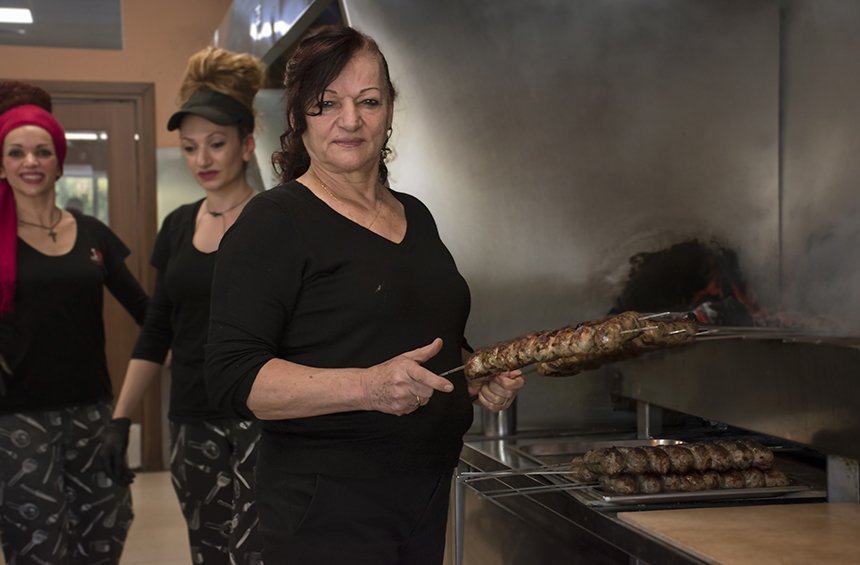
Mrs Kiki, one of the very few women in this job, has learned her craft from another woman, an aunt of hers in Paphos
“To tell the truth, our job is not one for a woman”, says Mary, the first daughter of Aristos and Kiki. Mother and daughters, though, have the leading roles at work, as well as in the house. Mary offered to make coffee, Georgia baked the dessert and Mrs Kiki set up the meeting, so that we could sit down, in their cozy lounge and talk it over, with men and children coming in, one after another. It was the kind of talks you have at family dinners on holidays, where everyone has something to say about the other (from funny things to embarrassing ones) but all are full of love and respect.
Even if they do a man’s job, these 3 women make sure to declare their femininity every single day, at any time of the day. Rich hair, all combed in a way that they fit their impressive looks, even on the heat of the work, makeup for accented eyes and lips, even over the grill, and an irresistible smile, seem to be their own “secret weapons”, for coming through this demanding job.
Thus, a role that asks of them to be men, made them even more feminine. It is not just a matter of looks. It is almost vital to have makeup on, since it works as an antidote for the physical distress that no one can avoid in this job.
“We are over the fire and the smoke for so many hours that, if we did not take care of ourselves, we would be in great discomfort”, says Mary.
Thus, she confirms that neither she, nor her sister or even Mrs Kiki could do this job any other way.
Would you do the same if you worked in an office?
MARY: Yes, exactly the same.
GEORGIA: It has nothing to do with the kind of job you do, but it does have to do with the way you want to feel about yourself. As soon as we get up we put on our eyeliner. This is something Mrs Kiki has taught us.
KIKI: Yes. When you wake up, you need to wash you face, put on a face cream and then your eyeliner. We don’t have any other time to take care of ourselves, other than those morning moments. If we don’t put them on, we will feel like sick all day.
Having this image, have you ever encountered any rude flirting or even harassment?
MARY: These are not common cases, but they were some, indeed. We are very careful, too, when it comes to our approach. We talk to people, we smile, but if we realize that someone is more than friendly, then we change accordingly.
ELIAS (Mary’s husband): We have many male customers and most of them are very respectful. There was only this one time when someone was standing outside the bench and he would keep calling for “Mary, this…” and “Mary, that…” in a non-respectful manner, so I intervened and there was some tension there but this is rather rare.
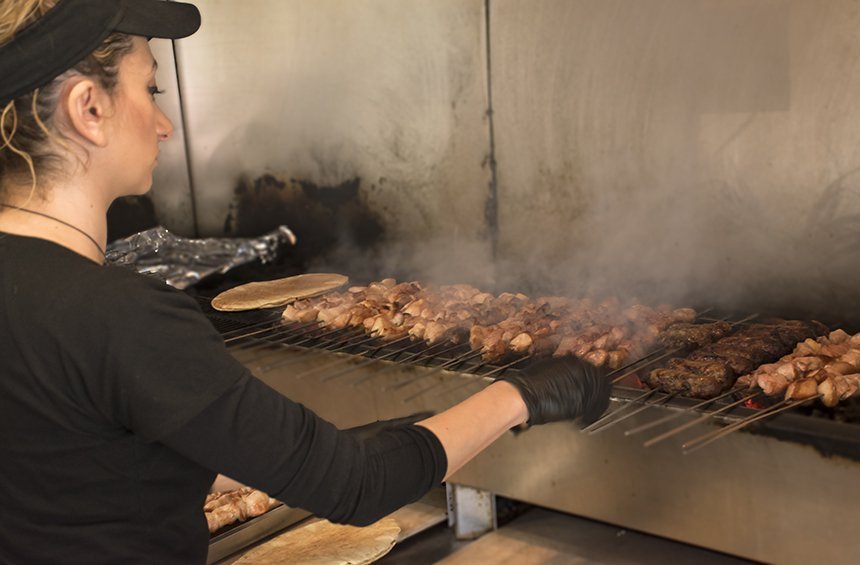
If you stand by the fire even for a few minutes, you know that these conditions can beat you down to pieces, if you don’t get away. Mrs Kiki, though, and her daughters have spent their entire lives in these conditions
Don’t you worry that this job will melt your makeup down?
MARY: Even if it does, we still put it on. We still do our makeup in the very morning, from 7 o'clock!
KIKI: There is also waterproof makeup available now! We only have to put it on once a day and that’s it. We do it over again the next morning.
GEORGIA: This is a daily routine. Even on days that we do not want to go out of the house, even when we stay in our pajamas, we still put makeup on.
Was it always easy to have the makeup you wanted?
KIKI: There were some hard times, when we did not even have anything to eat, so makeup and cosmetics were out of the picture, of course. Still, we usually could get our hands on some Nivea cream, at least.
MARY: Of course, we enjoy the “spa” of the grill every single day, too (laughs).
Others may use the sauna or a hydro massage, but we are constantly above the steam.
Truth be told, though, when our shift is over, we smell like a grill from head to toe and no one can approach us.
How do you manage in the summer time?
MARY: It is the hardest season, indeed, and people are even more demanding. But, we try for the best. On summer Sundays, when we go to work, our mind drifts away. We dream of boat trips with mojitos in our hands (laughs again).
You laugh, when one would expect the exact opposite, when found in 40 degrees over the grill.
MARY: you need to be able to have fun, even with the greatest trouble in your life. That’s why we always have music in the restaurant, since the very first moment we start working, until we close.
What kind of music do you listen to, when working?
GEORGIA: Anything, as long as there is music. It gets you into the beat and lifts your mood. It is a psychological boost, just like the makeup.
KIKI: Sometimes you don’t even notice the music, but if the radio turns off you can tell immediately.
Does the work ever stop?
ELIAS: On Sundays we make plans for Monday. Monday is the day for us to have a rest and have fun.
GEORGIA: We call it the Holy Monday!
Was this always the deal?
KIKI: No. This was arranged just lately. All of the previous years we would work 7 days a weeks, 18 hours a day. This is how the restaurant was set up. Because, someone could pass by these days and think that we have it good, but it wasn’t easy to get here. Now we have the staff to help us, too, but this means we have extra problems and responsibilities.

How does a woman spend 30+ years in this job?
KIKI: You don’t get a grasp of it. You enter from one door and exit from another.
How did you learn the craft?
KIKI: When I was about to graduate the primary school, I had to work. We were a big family, 9 siblings in total, and I was the second in line, so we had to work and bring money in the family. I went to work to an aunt of mine and she taught me to make sheftalies, and kebab on the grill. I worked for 3 - 4 years with her. I couldn’t be a seamstress, like other girls for example, because I'd need to be an intern and I wouldn’t get paid for that. I needed the money.
How hard was it for a 10-year-old girl to be a griller?
KIKI: It wasn’t that hard. We were used to hard work, at the fields or elsewhere, ever since we were 6 years old. You may find it unusual and rough to do this job, but it doesn’t make a difference for me.
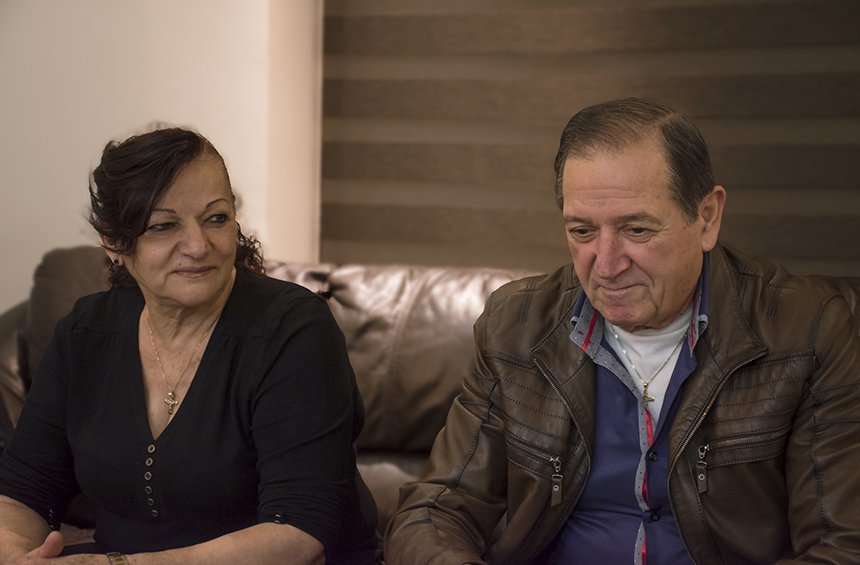
Aristos and Kiki from Paphos, became refugees, they fled the country and they relocated, until they could see their family established in Limassol.
When did you get your own shop?
KIKI: Years went by. I come from Emba in Paphos, but when I got married, in the beginning of the 1970s, we had to leave and go to Nicosia, because my husband was a musician and he could work in entertainment venues there. I was working at a marble factory. After a while, Aristos got a job in Kyrenia, as a musician in a hotel. The coup found us there and Aristos was imprisoned because, coming from Paphos, he was though to be a supporter of President Makarios.
On the Turkish invasion eve, he was released from the castle jail. Then, my husband suggested that we went to Paphos for a few days, because the funeral of a loved one was taking place. We arrived in Paphos at midnight and then we listened on the BBC that the Turkish troops had invaded Lapythos valley. We were seeing the ships in the sea for some days before, but we did not think something was going to happen. We left our place with just a suitcase for the night, but we had to stay in Paphos with nothing, where I gave birth to Mary, afterwards.
So you were refugees, even though you were staying at your parents.
KIKI: Yes, we had no place of our own, no jobs, nothing. My husband left to get a job in France and we followed him afterwards, as I was also with the baby.
They would not let us in the country at first. We had to buy a return ticket, in order to allow us to enter the country, just like it is now with refugees. We went back a month later and were allowed to stay a long time after.
When we came back to Cyprus, around the 1980s, we had to come to Limassol to get a job. Back then, Limassol started to have some appealing entertainment options and the places with live music worked every night, so my husband could find a job, playing the keyboards. Still, i had to work, too. I worked in hotels at first. Then we opened the shop at Makarios avenue, making traditional koupes and honey balls.
I also started working with my grandpa and grandma afterwards, at their shop on the seaside road. I worked there until the mid-1990s. We had partners at first, but we bought their share to make it work properly.
Was the area any different back then?
ΚΙΚΗ: Yes, it did not have as much traffic. In the mid-1990s, the road was finished. But, at first it was just us around here. We were not afraid, though. I could stay at the shop until 3 am by myself. Nowawadays, i'd be constantly worried that something might happen.

Mary and Georgia, the 2 daughters of Aristos and Kiki, remember their entire lives at the grill , but they taught themselves to have fun with it..
When did Mary and Georgia start working at the restaurant?
GEORGIA: Since forever. The same goes for our own children, too. I even made my first steps in the restaurant.
ELIAS: From birth (laughs). We would also take our own children to the restaurant, ever since they were babies in their basket.
MARY: When we still had the shop at Makarios avenue, I was just 7 years old. I would get the stool in front of the sink and wash the dishes.
What was the schedule? School – work – home;
GEORGIA: When I would get off school, I would go back home, where I stayed mostly with Elias and Mary. On Fridays, though, I would go to the restaurant for the whole weekend.
Was there time for holidays?
GEORGIA: Mrs Kiki used to tell us that our husbands were supposed to take us on a holiday, after we got married (laughs).
ELIAS: Αfter me and Mary got married, 12 years had to pass before we could take some time off and go on vacation. Our honeymoon was just a 1-day trip to Latchi.
Was this something you were forced to do so, or something you wanted?
GEORGIA: When you have your own business, there is no other option. You have to be there and help.
MARY: We all worked there. There was the need for hands to work and there was no option for hiring people back then, so we had to work, even though we had other jobs, too, like I did in an office and like Elias in a factory, or Georgia at a shipping company later on.
ELIAS: After 1997, when the new road was finished, we moved to the restaurant across the street, the one we still have now, and we established the family business, so we had to do our best to keep it.

Elias (on the left), Mary's husband, went to work since the very first moment he got engaged with his wife and he became as bonded with the job, as he did with Mary and her family, too.
You did study, though, and you did find office jobs.
MARY: Yes, I was working in an office, with my degrees in English language and accounting. I also had my degree as a kindergarten teacher, but, back then, the salary was better if you were working in an office, so I never pursued a job as a teacher. At the same time, I was working in the restaurant on weekends, because I also had my first child in 1995. Elias was at the restaurant everyday.
ELIAS: Since the first day in this family, I got to work at the restaurant. The first thing I did after I got engaged, was to make honey balls (laughs). I did learn the job just like everyone else did, from up close.
GEORGIA: I got my degree in shipping and I worked for a company, Marlow, for some years. That was the time for the family business to grow, though, so we needed more hands. My schedule was quite stressful, because I was working at the office, I had recently been engaged, and I had to work at the restaurant, too. I had to make things more simple, so I chose to stay in the restaurant. When you work for your own business, money's better. You know that the more and the better you work, the more money you will make. After all, Andreas, after we got engaged, also came to work, since he actually studied for it, too, being in the hoteliers' school.
So, Mrs Kiki must have been happy about your choice in husbands.
ELIAS: She gave the necessary principles to her daughters to do so (laughs).
Do your children follow the same path?
MARY: My daughter is studying Pharmaceutics in Thessaloniki. She is now in her 5th year. She was an excellent student and she could have been a doctor, but I thought that this would take too long.
I did not want her to quit the subjects she enjoyed the most, but I wanted her to be able to have a business of her own.
I have the same wish for my youngest daughter, too, for her to know that she can work and receive back from that work, just like what we did for so many years.
ELIAS: The daughters of the family, all of them, fall under the same model. Especially the youngest one, the daughter of Georgia, who has the same attitude as her grandma.

Aristi, the youngest granddaughter of Kiki and Aristos, daughter of Georgia and Andreas, grew up in the restaurant, just like everybody else, and she works with the same devotion her parents, aunt, uncle and grandparents do.
Is Mrs Kiki a strict boss?
KIKI: Yes, I am if you are asking for it. The work is supposed to be done right. If you don’t do it right, then I am strict. I do not give second chances, after I have warned them. If a supplier’s product is not good, they have to take it back and not come again. If you are not strict, everyone will try to push you over.
Have you always thought like that?
Difficulties sure do make a difference in you. After a hit, you definitely change. Now, in particular, if you are too good, you get victimized. The times are much more difficult now, while in the old times you could trust people. There is now sincerity now.
Are you calm at work, or nervous?
When I am on the grill, I am always calm. When I don’t grill, I do get stressed, because the people are demanding, and you need to be able to cover everyone’s needs. At the grill, you need to be calm, in order not to make any mistakes.
Is it easy to be with the family, both at the house and at work?
GEORGIA: The fact that we are 3 families now, sure is helpful. This way we can get time off and still have someone to take our place, either at work or at the house.
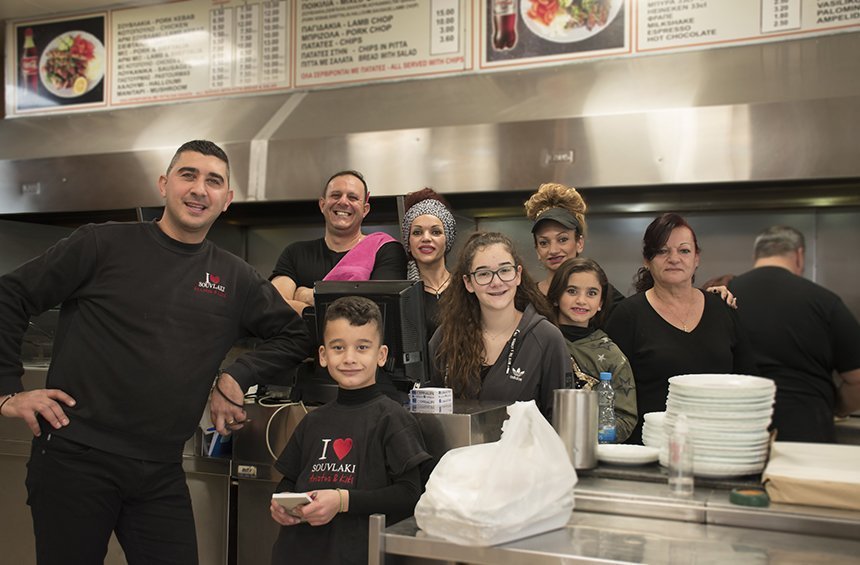
Sure, there is tension at work, but working with each other has made us stronger and closer as a family.
ELIAS: Sometimes, one of us will be a mother, a father, a grandma, a grandpa, an aunt and an uncle at the same time.
What reactions do you get from people, from your neighbors?
KIKI: They do respect us. We have good relationships with them and we arrange to have our coffee together from time to time.
ANDREAS: A typical example is what happened recently, when we needed to clean the sewage tank urgently. When we called the company, we were told that the technician was off duty and we had to communicate with him directly, to book a visit on the next day.
The man was off duty, indeed, he had showered and put on clean clothes to go for coffee. Once he heard, though, that we were calling from the Kebab house of Aristos and Kiki, he got up immediately.
So, he did come, as he was, with his clean clothes to our service, because, as he said, he appreciates the family and the work we do.
ELIAS: A similar incident took place with out staff, too. They were out on Saturday night and while going back home for on Sunday dawn the police stopped them for a check. When they told them they only had a few hours of sleep before they would get up to go to work at the restaurant, they let them go.
GEORGIA: Some time ago, a kid that used to work for us had just graduated from the Cyprus Higher Hoteliers Institute, applied for a position in a hotel. When he was called for an interview at Four Seasons Hotel, he mentioned in his references our restaurant and got hired immediately, since anyone knows how demanding this job is.

The family now has a strong team helping them at the restaurant. Even though all of them still worked there every day, the help was crucial in order for the work to get properly done and the business to grow.
ELIAS: The same happened for another girl, who was looking for a job at a Pharmaceutics company. If you have a working experience with Aristos and Kiki, it is an equivalent of special forces training.
MARY: People see how we work everyday and they know we strive to serve them in the best way possible. We respect our customers and they know it, they see that we are on fire (literally) to serve them and most of them admire that.
Which of the reactions you get are more positive, the ones from foreigners or from locals?
KIKI: Foreigners will leave you with a thousand thanks. The other day, we had a foreign businessman, who came to eat for a total cost of €80 and doubled the tip.
What do you plan for the future of your business?
ELIAS: Our son is already getting ready to come and take over. At some point, the kids will come back from their studies and we will retire to get some rest. Of course, we always try to evolve the way work, we go to course or even seminars for stress management, since this is a big issue when you are working so close to the fire.
ANDREAS: It is important to grow. Sure, we got to learn the job by doing it, but experience and knowledge coming from others is always needed. You have to get trained and educated all the time, as well as sourcing ideas from anything you see and make it your own, in order to get better.
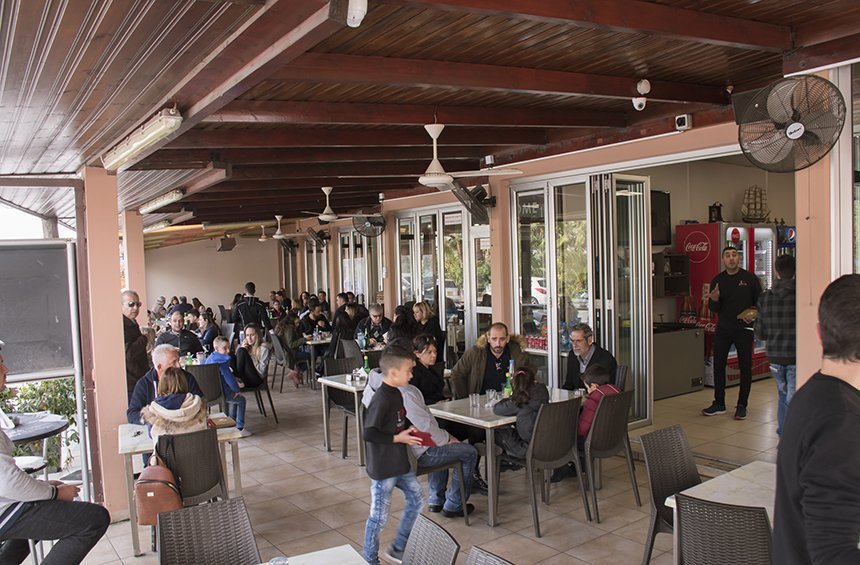
Aristos and Kiki restaurant is now much larger than the kebab spot they first started working in, at the corner across the street, in which they still are now. The perceptive eye of their neighbor, who offered them a good deal for buying all of his 4 shops, right next to their own, after seeing that their good work could only make the business larger
Do you think you are contributing to Limassol with your restaurant?
MARY: We hope that we do. It is always a great joy to know that our food is a favorite for people and they want to suggest anyone visiting Limassol a try. There are more people from Nicosia that like our kebab, than there are from Limassol, and we have many reservations from other cities, especially on Sundays.
ELIAS: We have well-known people coming to eat at our place, too. He hosted the president and members of the parliament, too, hotel owners and businessmen, both from Cyprus (like Mouskis, Frantzis, Loutsios and other) and abroad, from Israel Russia, Germany, India, Poland. We also host athletes and artists, who perform in Limassol and their agents bring them to us, in order to please them.
Do you go to other places in Limassol?
GEORGIA: Of course! We are 35 years old, we cannot stay in the house or just go to work. No matter how many hours we may have been at the restaurant, if we decide to go out, we get back home, change and go have fun.
ANDREAS: We deal with many people every day and there are owners of entertainment venues among them too, so just as we like to see them in our place, they like to see us in theirs. We know a lot of the owners, or even people working in these places, like Guaba, Rio Bravo, Retro and others.
We try to go for a drink, on Friday, Saturday or Sunday. Mrs Kiki comes with us, too! In fact, Yiannis, the owner of Guaba Beach Bar, says that Mr Aristos and Mrs Kiki are like a good charm every time they visit.
He is always very happy to see them, every time we go for a drink. We have great relationships with all of our neighbors, of course, with bakeries, pharmacies and other shops.
ELIAS: We go to other places, too, though. Notes is a regular, but we go to Patsalides’ shows at Ravens, too, anywhere that is not too crowded, where we can sit, since we are kind of older now. Breeze, for example, is a good option for me, only if there is a couch available.
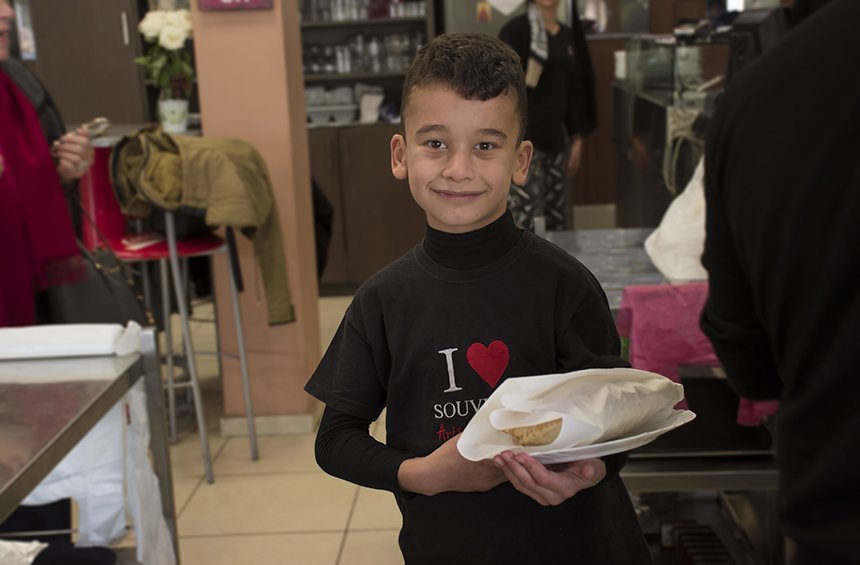
Georgia, the youngest daughter of Mary and Elias, still in the 3rd grade of secondary school, acts, talks and thinks like a kid much older than her, almost like a young adult. She may say that she is the family’s rebel, but she seems to embody all of the images and messages she experiences daily in the family business, next to these powerful women, who set the beat for everyone in the house to march with.
Young Georgia’s words, though, are in fact a mature and essential conclusion of everything the 2 previous generations had to teach the third one. “I am mature enough to know when my family really needs me at the restaurant and I will always be there, when I need to. The restaurant helped me to grow a lot. This is something my teachers see in me, too, and I feel great about it. After all, respect is also something I learned from a very young age at work. The restaurant is part of myself now, I learned a lot there: I did my first math at the counter, I learned how to react in different situations, how to properly communicate with people, but above all, I learned respect”.
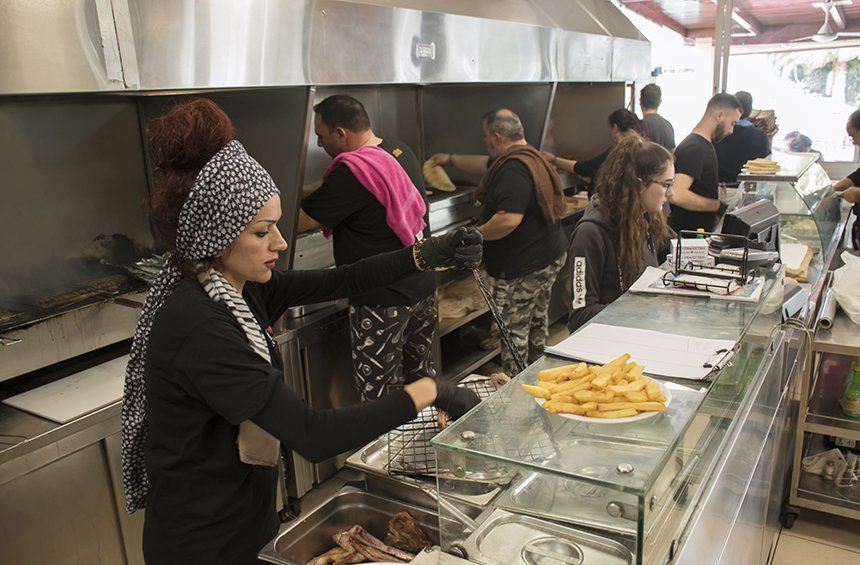
The 14-year-old Georgia, the youngest daughter of Elias and Mary, spend several weekends at work, but she found ways to have a good time there, by her family.
Wouldn’t you prefer to be with your friends, instead of going to work?
I have the freedom to go out with my friends, if we have something arranged. But I do like to be at the restaurant, because I am with my family. Sure, it is difficult and exhausting to work there. I like the take away part more, because I am by myself, in peace and quiet. I also like the waitressing position, because I get to work with Andreas, who is always very nice. There is no job I don’t like. I can even be at the grill or at the sink washing dishes.
Would you like to keep working at the restaurant?
It depends. I wouldn’t like to be at the grill. It is a dilemma: to have your own business or not? The stress is greater and the working hours, too.
Nobody will care for you own business more than you ever will. The staff doesn’t care as much. When I decide to have a child in the future, for example, I wouldn’t feel the need to be at the restaurant, especially when 9 months pregnant. My mom and aunt did so, but I don’t know if I want to.
Aristi, much younger than Georgia, found herself in the restaurant, learning about how things work since her infancy, just like all of Aristos’ and Kiki’s grandchildren. These cousins have a great time working with each other, just like their parents did it for decades. In fact, Aristi is considered to be a lot like her grandmother, both in attitude and skills. Since a very young age she started helping with the cleaning, she has served as a waitress next to her father, she heat up the pita bread on the grill, but her greatest talent - as everyone admits - is the cashier’s post, even if she is just a primary school student.
More than 30 years, 3 generations of the same family, millions of kebabs and pita bread. If they sit down for the resolutions of a life over the grill, they will probably lose count. But, there are also some things that can be counted: the appreciation they receive by those hosted in the restaurant, their good name they make for their business, as well as their city, their satisfaction for seeing their efforts to bring a result, but above all, the ethical heritage leaving behind to their children.
Therefore, Kiki and Aristos, and their daughters with their husbands, can feel proud for the delicious kebab they make, but, also, for bringing up young people with good character, principles and values, who will in turn, be proud to say that their grandparents arrived in Limassol looking for a safety board and created something that the entire city is proud of. After all, this city was built by people like these, hard workers and straight-forward personalities, who put a piece of themselves in what they do, bringing the best results for Limassol, too. So, when you say that Limassol is its people, you know that this is the kind of people you are talking about.